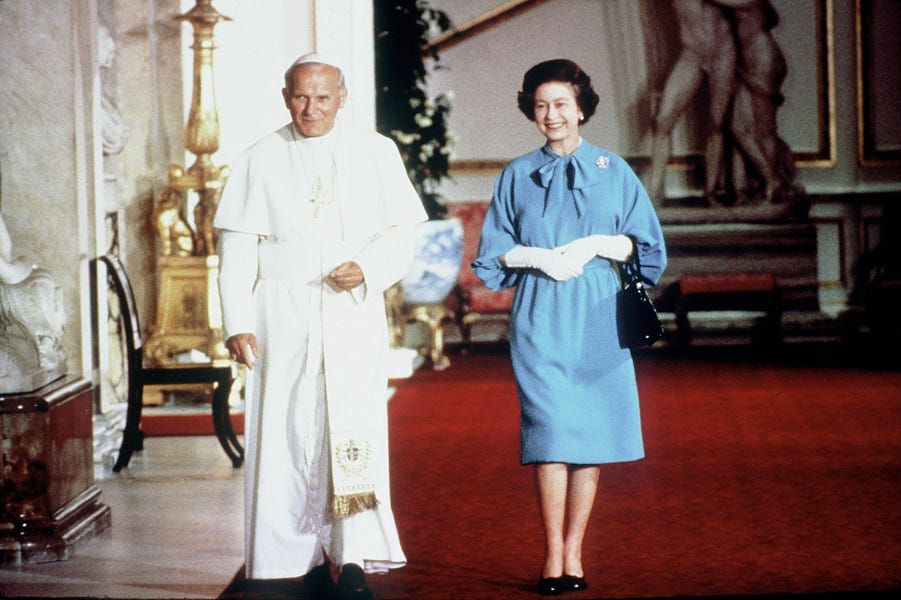King Charles III acceded to the British throne sometime Thursday afternoon. But very few people are talking about the beginning of a new Caroline era. We are far more interested in the passing of what Sir Winston Churchill called the new Elizabethan Era. That era has, after 70 years, ended.
Queen Elizabeth II’s death is an epochal event. Her long reign coincided with a cultural and social transformation of Britain, even if she, privately, was a thoroughly conservative person by nature. That conservatism forced her at times to live with changes in culture, politics, and society she obviously disliked. Her constant vigilance over her public perception ensured that she was in fact largely seen as nonpartisan. The notion that she was apolitical seems less convincing. A monarch is by its nature political; laws are issued in their names and every law since 1952 was legally done with Elizabeth’s imprimatur. A thoroughly conservative figure in an utterly conservative institution oversaw the liberalization of British society, all the while holding herself up as a stolid model of bourgeoise conservatism to be emulated. Her very actions seemed to cast doubt on the changes that a younger, more progressive Britain pursued. Charles III said his mother had an “abiding love of tradition” conjoined to a “fearless embrace of progress.”
Change and stability went hand-in-hand during Elizabeth’s reign, and it’s perhaps the unique (and to Americans, alien) permanence of her person that enforced at least a passing notion that America, while good, might not have a monopoly on the greatest statesmen, the greatest institutions, the greatest culture, etc. This woman who had neither sparkling intellect or show-stopping looks somehow became the absolute best argument for a system of government Americans threw off in 1776. Elizabeth visited and liked the United States, but she could never have been mistaken for a devotee of a broad Anglophone world that included the United States.
The un-Americaness of Elizabeth II was made clearer as every successive generation of Britons aped North Americans. Post-war American affluence, fashion, and bluster seemingly shrank British influence, and yet in public deportment and raw gravity, none of the American presidents she met during her reign—with the possible exception of Ronald Reagan—could match her moral and social presence. Obama, Trump, and Biden all seem like amateurs in the presence of royalty, and that’s because perhaps they are in a sense. The British monarch is a head of state whose power is largely symbolic—but they are still heads of states nonetheless. Elizabeth understood that she was the actual human embodiment of the United Kingdom. Frivolity, therefore, seemed entirely outside of her character. Certainly Elizabeth was light-hearted and even fun at times; her visible excitement at winning Royal Ascot, and her delight in cows at a livestock show, were not the actions of a person who was temperamentally stern. But Elizabeth didn’t publicly kiss babies or hug fawning fans.
In an era of rising global populism Elizabeth’s necessary aloofness became perhaps her greatest asset. Maintenance of liberal democracy became the teleological end of British politics and pop culture, and Queen Elizabeth at least publicly saw no reason to signal open disapproval. It seems impossible however to believe that this woman, born during the reign of a grandfather who himself was born only two months after Gen. Robert E. Lee surrendered at Appomattox, fearlessly embraced progress as it was understood in 2022. Her dress, her speech, her manners, and her piety were all from a different era. She could not have been more different than the contemporary right or left of British society. She nonetheless was revered by most of her subjects. It was this essential personal and institutional anti-populism that helped give Britain relative stability in the post-war era.
Christianity remained a fundamental aspect of Elizabeth II’s life even as it slipped into relative insignificance among her subjects. Ever-aware that she was supreme governor of the Church of England, she attended church routinely. Her piety was thoroughly traditional, and her favorite preachers tended to be conservative. She talked regularly about Jesus with earnest grace and gravity that eludes any American president.
Elizabeth’s legacy is such that one of her former prime ministers, Boris Johnson, has already taken to calling her Elizabeth the Great. Historians will decide on whether Elizabeth was a great monarch or not. What seems demonstrably true from her life is that she was unambiguously good, and her goodness might be what made her great. Her goodness was essentially one driven by gratitude and affection for her people. Although she was serious, she was never a scold or a blowhard. The American republic presently swings between tribes obsessed with the United States’ supposedly unparalleled greatness on one side, or its loathsomeness on the other. The American people have seemed content to elect scolds and blowhards throughout our history, and the last decade has proven to be no different. Elizabeth was neither. In Elizabeth II, the Anglophone world has lost a ruler who sought to not to be great, but to be good. Would that there were more like her.






Please note that we at The Dispatch hold ourselves, our work, and our commenters to a higher standard than other places on the internet. We welcome comments that foster genuine debate or discussion—including comments critical of us or our work—but responses that include ad hominem attacks on fellow Dispatch members or are intended to stoke fear and anger may be moderated.
With your membership, you only have the ability to comment on The Morning Dispatch articles. Consider upgrading to join the conversation everywhere.